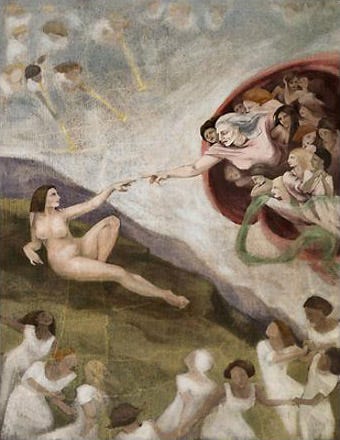the Empathy List #80: Deconstructing? Stories for the Journey.
Resources for Deconstructing Evangelicals, Part 4
This is a series in which I’m sharing stories of religious deconstruction and reconstruction. If you find it compelling, would you share it with a friend?
Hello friend, Liz here.
I hoped to bring you another deconstruction story today (I have one in the wings), but I confess, last week was not what I expected. In fact, I received some devastating news: my memoir will not be published, as I had been planning for it to be.
I’ll share more about this later, but for now, here’s what I’ll share: it sucks and it’s unfixable and it shifted my priorities for last week and this one. I am just an ordinary human, after all. Sigh.
So, instead, I present to you what I wish I’d had when I’d begun my own journey of examining the faith I knew and loved:
Deconstruction & Reconstruction Resources for Former and Questioning Evangelicals, Like You and Me
These are not “fixing your doubts” resources. Nor are they “f**k all Christians and churches everywhere” resources. I am never interested in the extreme ends, but more, the middle journeying.
So, today, I’m sharing the stories and artistic expressions that document deconstruction or refreshed me during reconstruction as I began to journey toward Jesus in fresh ways.
When you want to stay Christian, but you have the “wrong” politics:
Listen: The Holy Post podcast’s “Jesus and John Wayne series” with Kristen Du Mez gives the back story for how Republican came to mean Evangelical Christian.
Read: Anne Lamott’s essay collection, Traveling Mercies was one of the first books I read by a serious Christian who was also a democrat. Also she’s hilarious.
Read: D.L. Mayfield’s essay collection, The Myth of the American Dream: Reflections on Affluence, Autonomy, Safety and Power breaks all the party lines.
Read: Dante Stewart’s memoir, Shoutin’ in the Fire: An American Epistle, which echoes the themes of James Baldwin’s The Fire Next Time, while directly addressing the racism inherent in the white American church.
When your church “family” harmed or abused you:
Listen: The Rise and Fall of Mars Hill podcast documents one of the most dysfunctional churches and the fall out of its ministry.
Listen: “Quietly Out the Side Door” episode from the Dirty Rotten Church Kids podcast tells how the hosts—a former youth pastor and worship leader—were shown the exit at the church where they’d ministered for years.
Read: Barbara Brown Taylor’s Leaving Church is an understated and moving story of a minister leaving ministry.
When your former church labels you a “heretic”:
Watch: “The Heretic,” a documentary that follows Rob Bell after his controversial book Love Wins was skewered by the evangelical community.
When you need to remember that Christ is bigger than our denominations:
Listen: The Cosmic Egg series from Another Name for Every Thing podcast. Welcome to the idea of the cosmic Christ and to the mystical and kind teacher, Father Richard Rohr (gotta love those Fransiscans).
Read these alternative Christian and religious publications: Sojourner’s Magazine, the Christian Century, Commonweal, Comment Magazine, American Magazine, Religion Dispatches, Religion News Service, Red Letter Christians.
When growing up within evangelicalism was confusing or harmful:
Read: Addie Zierman’s memoir, When We Were on Fire is an account of a devout teen (all the youth group culture!) questioning her faith.
Listen: “When the Church Harms You” episode of the podcast, Where We Find Ourselves, a therapy podcast that interviews psychologists (like, real, qualified therapists) of faith.
When you can’t hear God’s voice anymore:
Read: Still: Notes on a Mid-Faith Crisis by Lauren F. Winner, a memoir of divorce and God’s voice going quiet.
When your spouse leaves the faith, but you want to stay:
Read: Stina Keilsmeier-Cook’s readable and moving memoir, Blessed are the Nones: Mixed Faith Marriage and My Search for Spiritual Community tells the story of staying committed to your marriage even when your in-laws believe your spouse is going to hell.
Listen: “The Other Side of the Mattress” from the Liturgists Podcast. The wives of Science Mike and Michael Gungor describe what it felt like when their husbands’ faiths shifted.
When you leave the faith, but your spouse wants to stay:
Listen: “Lost and Found, Part 1” and “Part 2” from the Liturgists Podcast. Science Mike and Michael Gungor tell their deconversion and reconversion stories.
When you’re no longer a Christian but still have church baggage:
Read: On Her Knees: Memoir of a Prayerful Jezebel chronicles Brenda Marie Davies’ unconventional journey from purity culture to sexual freedom.
Read: Priestdaddy is Patricia Lockwood’s memoir of growing up with a dysfunctional Catholic priest as a father.
Read: Meghan O’Gieblyn’s essay collection, Interior States, is a stunning reckoning with her Christian upbringing from a writer who has left the faith.
I’d love to hear what resources and stories have spoken to you as well — thus far, I’ve not included anything informational and I’ve not recommended any accounts to follow specifically. But if you want to give input or recommendations, fire away!
Thanks for reading. Warmly, Liz Charlotte Grant
By the way… I WANT TO HEAR YOUR STORIES of deconstruction, too!
If you have a deconstruction/reconstruction story, I’d be grateful to hear from you! (REPLY to this email, or get in touch via my DMs or lizcharlottegrant@gmail.com.)
Curious Reads
#1 Do you call God a “he”?
And how would it feel to swap your pronouns to “they/them”?
“Despite the male-centric circumstance of the [Bible], God is not defined strictly in masculine language. The Bible sometimes utilizes grammatically feminine words for God, such as ruach, which is the Hebrew word for God’s spirit. The writers of the Bible repeatedly compare God to a mother (Deuteronomy 32:11-12, 18; Psalm 131:2; Isaiah 42:14; 49:15; 66:13; Hosea 11:3-4; 13:8). In the gospels, Jesus likens himself to a mother hen wishing to protect her children in the safety of her wings (Matthew 23:37; Luke 13:34). Additionally, Jesus describes the Christ-character as a woman in the parable of the lost coin (Luke 15:8-10). These passages paint stunning and emotional portraits of God’s femininity.”
#2 On Saturday, a Korean American woman was followed home and stabbed by a mentally-disturbed white man.
Her story is chilling and heart-breaking, and it compounds the pain the the AAPI community already feels, as hate crimes against them continue to rise.
#3 A writer organized and edited every one of her journal entries over the past 10 years, 500,000 words in total, and then pasted them together alphabetically in a spreadsheet.
She wanted to see the patterns that she returned to and the way that she viewed herself and her own life over time.
And it’s a fascinating read. Can you, like me, see yourself in her words?
“Actually, he doesn’t love you. Actually, he doesn’t want you. Actually, he is looking around the world for another girl, and because of who he is, he will find her and be with her. Added in about 4,000 words, bringing it to 56,000. After all, one does have to get back to work. After he left, I lay in bed, hung over, and the sun was shining into my room for the day. After that, I got in a cab and came home. After that, we all walked by the river. Alice Munro’s first book appeared when she was 37. All I am ambitious for is to publish this piece. All I ever wanted was to be an adult. All I ever wanted when I was younger was to be a writer, to be able to sit in one place and write things forever, and not feel like I had to do anything else. All I want are some more experiences with him. All I want is breakfast with my friends, and to return home to the rest of this bright and beautiful, sunny day. All I want is to read books for a year.”
#4 Why are people calling bitcoin a new religion?
#5 On the symbolism of “masking” and “the mask” we wear during this pandemic.
Consider the mask. Not masks, mind you, but “the mask.” What is this symbol with which we have had to contend and live for the past year and a half? That mask made a distinctive appearance in our collective consciousness in 2020—as veil, as badge, as uniform, as deception, as guarantor of anonymity, as social and medical prophylactic. And, although its widespread use will depend on changing public health guidelines as well as the willingness of the public to go along with those guidelines, the mask will almost certainly continue to be an element of daily life in the long tail of the pandemic.
But even before the pandemic fully recedes, can we finally discuss the meaning of the mask without our customary moralism and habit for quick takes?
Just for fun…
Whether we liked it or not, the Superbowl filled up all our social feeds this weekend.
Personally, my favorite new tradition was the pre-game… watching “How to Football” with my kids the day before. Enjoy this vintage Disney film, poking fun at football culture a la Goofy. ;-)






